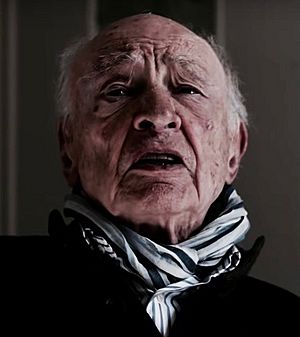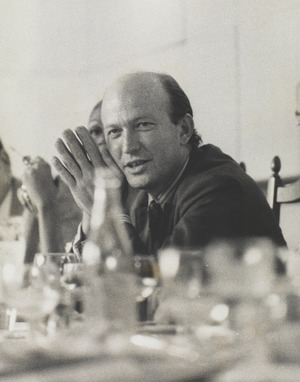Edgar Morin facts for kids
Quick facts for kids
Edgar Morin
|
|
|---|---|
 |
|
| Born |
Edgar Nahoum
8 July 1921 Paris, France
|
| Alma mater | University of Paris |
|
Notable work
|
La méthode (1977–2004, 6 vols.) |
| Spouse(s) |
Violette Chapellaubeau
(m. 1945) |
| School | Continental philosophy Antireductionism Constructivist epistemology Anti-foundationalism |
| Institutions | CNRS, École des hautes études en sciences sociales (EHESS) |
|
Main interests
|
Epistemology Complexity theory Sociology |
|
Notable ideas
|
Complex thought Chaosmos Criticism of structuralism Criticism of Ludwig von Bertalanffy's systems theory autos (auto-(geno-pheno)-eco-re-organization) |
|
Influences
|
|
Edgar Morin (/mɔːˈræn/; French: [ɛdɡaʁ mɔʁɛ̃]; né Nahoum; born 8 July 1921) is a French philosopher and sociologist of the theory of information who has been recognized for his work on complexity and "complex thought" (pensée complexe), and for his scholarly contributions to such diverse fields as media studies, politics, sociology, visual anthropology, ecology, education, and systems biology. He holds two bachelors, one in history and geography and one in law, and never did a Ph.D. Though less well known in the anglophone world due to the limited availability of English translations of his over 60 books, Morin is renowned in the French-speaking world, Europe, and Latin America.
During his academic career he was primarily associated with the École des hautes études en sciences sociales (EHESS) in Paris.
Contents
Biography
At the beginning of the 20th century, Morin's family migrated from the Ottoman city of Salonica (Thessaloniki) to Marseille and later to Paris, where Edgar was born. He is of Judeo-Spanish (Sefardi) origin.
When the Germans invaded France in 1940, Morin assisted refugees and joined the French Resistance. As a member of the French Resistance he adopted the pseudonym Morin, which he continues to use. He joined the French Communist Party in 1941.
In 1945, Morin married Violette Chapellaubeau and they lived in Landau, where he served as a lieutenant in the French Occupation army in Germany.
In 1946, he returned to Paris and gave up his military career to pursue his activities with the Communist Party. Due to his critical posture, his relationship with the party gradually deteriorated until he was expelled in 1951 after he published an article in L'Observateur politique, économique et littéraire. In the same year, he was admitted to the National Center of Scientific Research (CNRS).
Morin founded and directed the magazine Arguments (1954–1962). In 1959 his book Autocritique was published. The book was a sustained reflection on his adherence to, and subsequent exit from, the Communist Party, focusing on the dangers of ideology and self-deception.
In 1960, Morin travelled extensively in Latin America, visiting Brazil, Chile, Bolivia, Peru and Mexico. He returned to France, where he published L'Esprit du Temps, a work on popular culture.
That same year, French sociologist Georges Friedmann brought him and Roland Barthes together to create a Centre for the Study of Mass Communication that, after several name changes, became the Edgar Morin Centre of the EHESS, Paris.
Also in 1960 Morin and Jean Rouch coauthored the film Chronique d'un été, an early example of cinéma vérité and direct cinema.
Beginning in 1965, Morin became involved in a large multidisciplinary project, financed by the Délégation Générale à la Recherche Scientifique et Technologique in Plozévet.
In 1968, Morin replaced the incumbent professor of philosophy, Henri Lefebvre, at the University of Nanterre. He became involved in the student revolts that began to emerge in France. In May 1968 he wrote a series of articles for Le Monde that tried to understand what he called "The Student Commune." He followed the student revolt closely and wrote a second series of articles in Le Monde called "The Revolution without a Face," as well as coauthoring Mai 68: La brèche with Cornelius Castoriadis and Claude Lefort.
In 1969, Morin spent a year at the Salk Institute for Biological Studies in La Jolla, California. Jonas Salk invited him under the recommendation of Jacques Monod and John Hunt, with the sole imposed condition of learning. It was there, in this "breeding ground for Nobel Prizes" that he familiarized himself with systems theory. He read Henri Laborit, James Watson, Stéphane Lupasco, Bronowski, and was introduced to the thought of Gregory Bateson and the "new problematic in ecology".
In 1983 he published De la nature de l’URSS, which deepened his analysis of Soviet communism and anticipated the perestroika of Mikhail Gorbachev.
In 2002 Morin participated in the creation of the International Ethical, Scientific and Political Collegium. Also that year, he made a trip to Iran with Dariush Shayegan.
Following a meeting at a music festival in Fez, Morocco, in 2009, Morin became close with sociology professor Sabah Abouessalam. The couple married in 2012. He collaborated with her on the text, L'homme est faible devant la femme (Presses de la Renaissance, 2013), and in 2020 on Changeons de voie - Les leçons du coronavirus (Denoël, 2020).
Morin's work has become increasingly accessible to the English-speaking world, notably with the 2022 publication of The Challenge of Complexity: Essays by Edgar Morin, which compiled 32 essays, including some that were translated into English for the first time. Morin worked on this collection with sociologist Amy Heath-Carpentier at the age of 101.
Recognition, honours and legacy
Morin did not embrace the French postmodern or poststructuralist movements, instead pursuing his own research agenda. As a result, US academics did not transport his theories into disciplinary discourses in same fashion as they did Foucault's, Derrida's and Galinon-Mélénec's. However, Morin's work spans scholarly and popular literature, and he has appeared on the cover of multiple publications including Sciences Humaines and a special issue of Le Monde.
In addition to being the UNESCO Chair of Complex Thought, Morin is known as a founder of transdisciplinarity. As of 2013[update] he holds honorary doctorates in a variety of social science fields from 21 universities: Messina, Geneva, Milan, Bergamo, Thessaloniki, La Paz, Odense, Perugia, Cosenza, Palermo, Nuevo León, Université Laval in Québec, Brussels, Barcelona, Guadalajara, Valencia, Vera Cruz, Santiago, the Catholic University of Porto Alegre, the Universidade Federal do Rio Grande do Norte, and Candido Mendes University in Rio de Janeiro.
Several academic institutions have been named in his honour, with research centres based on his transdisciplinary methods and philosophy. These include:transdisciplinary methods and philosophy.
- Edgar Morin Centre in Paris (formerly Centre d'Études Transdisciplinaires, Sociologie, Anthropologie, Histoire, or CETSAH), a graduate teaching and research unit of the École des Hautes Études en Sciences Sociales (EHESS) and of the French Centre National de la Recherche Scientifique (CNRS) in Paris
- Edgar Morin centre for the study of complexity at the University of Messina, Messina, Sicily, Italy
- Multiversidad Mundo Real Edgar Morin in Mexico, a university
- A research centre at Ricardo Palma University in Lima, Peru
Morin is the subject of several biographies as well as documentary films and TV shows. His work has been influential in southern Europe, Latin America, Francophone Africa, and more recently China and Japan.
His 100th birthday in 2021 was celebrated in France, Italy, and Latin America, and several collections of essays were published in his honour.
Morin was elevated to the dignity of Knight Grand Cross of the Legion of Honour, in the Honours List of Bastille Day 2021 by French President Emmanuel Macron.
Polycrisis and Complex Thought
Edgar Morin is not only the originator of the concept of polycrisis but also a leading figure in developing a framework for understanding the interconnectedness and complexity of global phenomena. His contributions span a wide array of disciplines, providing tools to analyze and address the multifaceted challenges of the 21st century.
1. Polycrisis
The term polycrisis, first introduced by Edgar Morin, describes a situation in which multiple crises—environmental, social, economic, and political—are interconnected, amplifying each other’s impacts. This concept is deeply rooted in Morin's work, particularly in Terre-Patrie (1993) (Homeland Earth: A Manifesto for the New Millennium', 1999), where he explores how the global ecological crisis is inseparable from broader systemic issues such as inequality, governance failures, and cultural fragmentation.
- Key principles:
- Crises are not isolated but interact dynamically, creating feedback loops (Terre-Patrie , 1993; La Méthode , Tome 1, 1977).
- Solutions to one crisis can exacerbate others, requiring integrated and systemic responses.
For more details, see the dedicated Polycrisis page.
2. Complex Thought
Morin's complex thought (pensée complexe) forms the foundation of his intellectual contributions. It is a paradigm that seeks to transcend reductionism by integrating multiple dimensions of reality.
- Core principles:
- Dialogical thinking: Reconciling contradictions, such as order and chaos, unity and diversity.
- Hologrammatic principle: Each part of a system contains the whole in some way.
- Recursive organization: Feedback loops between systems and their components.
3. The Paradigm of Complexity
Morin’s paradigm of complexity offers a methodological and epistemological shift in approaching knowledge. He advocates for connecting disciplines to address real-world problems, such as the polycrisis.
- Application areas:
- Climate change and sustainability.
- Education reform.
- Governance in times of uncertainty.
4. Auto-eco-re-organization
This concept emphasizes the self-organizing capacity of systems, coupled with their interaction with their environment (eco) and their ability to reorganize in response to challenges (re-organization). It is particularly relevant in understanding ecological systems and human societies.
- Examples:
- Ecosystem resilience in the face of climate change.
- Societal adaptation during global crises.
5. Reliance
Morin identifies reliance — the human capacity to create and maintain meaningful connections—as essential for addressing complex problems. This concept underscores the importance of solidarity and cooperation in a fragmented world.
6. Metamorphosis
In contrast to revolution, Morin proposes metamorphosis as a framework for understanding profound but gradual transformations in societies. This idea reflects his optimism for a potential transition to more sustainable and equitable systems.
7. Chaosmos
A synthesis of chaos and cosmos, this concept highlights the interplay between disorder and order in complex systems. It is a central idea in Morin’s reflections on systems theory and ecology.
8. The Reform of Thinking
Morin emphasizes the need for a reform of thought to address the challenges of the polycrisis. He advocates for education that fosters:
- Interdisciplinary knowledge.
- Critical thinking.
- Awareness of uncertainty and interconnectedness.
Edgar Morin’s work on polycrisis and complex thought provides a vital intellectual toolkit for navigating the challenges of an interconnected and uncertain world. His concepts—rooted in systems thinking and transdisciplinarity—continue to inspire solutions to global crises, emphasizing the importance of holistic, adaptive, and cooperative approaches.
| Works (selection) |
|---|
Books
Articles
Conferences
|
| Honours | |||||||||||||||||||||
|---|---|---|---|---|---|---|---|---|---|---|---|---|---|---|---|---|---|---|---|---|---|
Honours
|
See also
 In Spanish: Edgar Morin para niños
In Spanish: Edgar Morin para niños
- Constructivist epistemology
- Systems thinking
- Autopoiesis
- Anti-foundationalism
- Language of thought hypothesis


